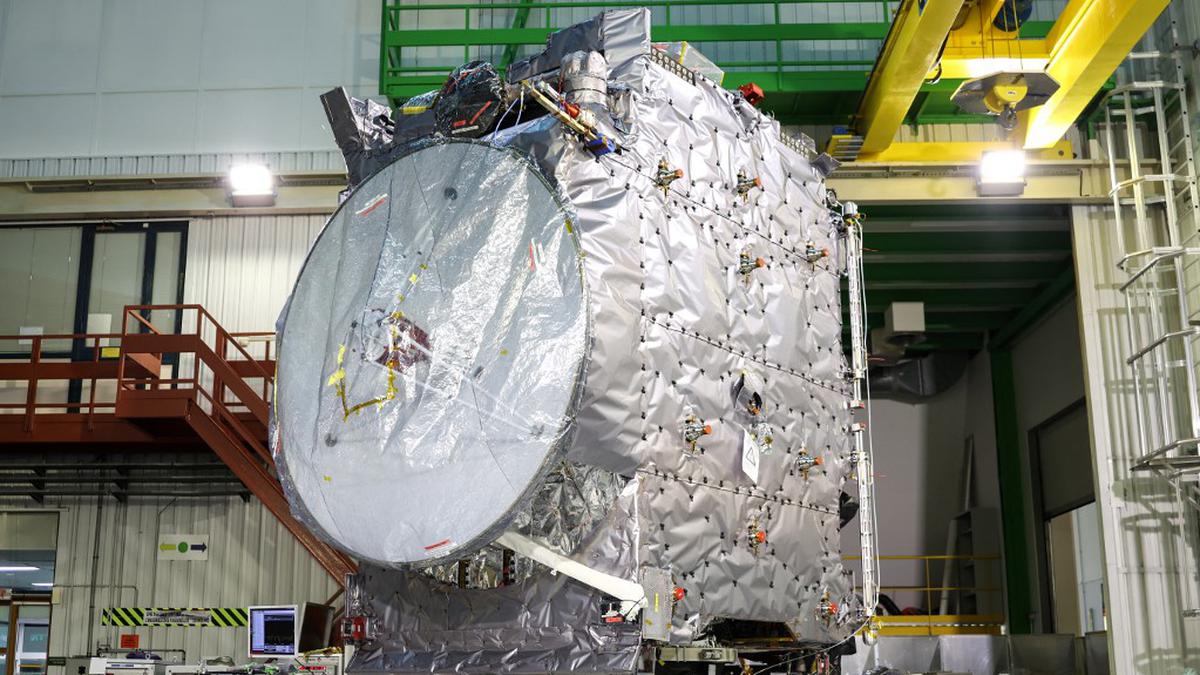
In this file photograph, the ESA’s (European Space Agency) “Juice” probe is unveiled for media in Toulouse, southwestern France, a number of days forward of its departure to Kourou house centre
| Photo Credit: AFP
The launch of the European Space Agency’s JUICE mission, which goals to find whether or not Jupiter’s icy moons are able to internet hosting extraterrestrial life, was postponed on April 13, 2023 for twenty-four hours as a result of dangerous climate.
The launch was referred to as off simply minutes earlier than the deliberate lift-off at 1215 GMT from Europe’s spaceport in Kourou, French Guiana, due to the specter of lightning within the cloudy skies overhead.
The subsequent try will now happen inside 30 seconds of the identical time on Friday, the European Space Agency mentioned.
Stephane Israel, the CEO of French agency Arianespace accountable for the Ariane 5 rocket, advised AFP that with simply minutes to spare, “a large mass of clouds approached and we absolutely could not proceed with the launch due to the risk of lightning”.
For lift-off to go forward, three parameters should get the inexperienced mild: the launcher, the probe and the climate — which was “the final suspense,” he mentioned.
On Friday, the chance of lightning can be monitored “until the last moment,” he added.
The delay was introduced to the Jupiter management room in Kourou, the place many individuals, together with Belgium’s King Philippe, had gathered to look at the launch.
Liquid water oceans
If the climate permits a launch on Friday, the JUpiter ICy Moons Explorer (JUICE) continues to be on observe to reach on the fuel large in July 2031.
The uncrewed, six-tonne spacecraft will examine Jupiter’s icy moons, which had been first found by astronomer Galileo Galilei greater than 400 years in the past.
The discovery of giant oceans of liquid water — the primary ingredient for all times as we all know it — kilometres beneath their icy shells has made them prime candidates to doubtlessly host life in our celestial yard.
Once launched, JUICE will take a protracted and winding path to Jupiter, which is a few 628 million kilometres (390 million miles) from Earth, utilizing different planets for a gravitational increase alongside the best way.
First, it should do a fly-by of Earth and the Moon, then will slingshot round Venus in 2025 earlier than swinging previous Earth once more in 2029.
Once the probe arrives in 2031, it might want to very rigorously hit the brakes to enter Jupiter’s orbit.
From there, JUICE will deal with Jupiter’s and its three icy, ocean-bearing moons Europa, Ganymede and Callisto.
Its 10 scientific devices — together with an optical digicam, ice-penetrating radar, spectrometer and magnetometer — will analyse the native climate, magnetic subject, gravitational pull and different components.
Europa, one of many prime candidates for alien life, can be investigated by NASA’s Europa Clipper mission, which is scheduled to launch in October 2024.
First in one other moon’s orbit
JUICE, in the meantime, will set its sights on Ganymede, the Solar System’s largest moon and the one one which has its personal magnetic subject, which protects it from radiation.
In 2034, JUICE will slide into Ganymede’s orbit, the primary time a spacecraft could have achieved so round a moon apart from our personal.
Ganymede might include extra liquid water than all of Earth’s oceans, in keeping with some estimations.
The mission won’t be able to straight detect the existence of alien life, however as a substitute goals to ascertain whether or not the moons have the precise circumstances to harbour life.
If there may be life in these buried oceans, scientists theorise it could doubtless be primitive microbes like micro organism, that are able to surviving on Earth in such excessive environments.
The 1.6 billion-euro ($1.7 billion) mission will mark the primary time Europe has despatched a spacecraft into the outer Solar System, past Mars.
The postponement comes throughout a disaster for European house efforts, after Russia pulled its Soyuz rockets in response to sanctions over the battle in Ukraine.
Combined with repeated delays to the subsequent technology Ariane 6 rockets and the failure of Vega-C’s first business flight final yr, Europe is struggling to launch its missions into house.
The JUICE mission is anticipated be the second-last launch for Ariane 5 earlier than it’s changed by the Ariane 6.
Source: www.thehindu.com




